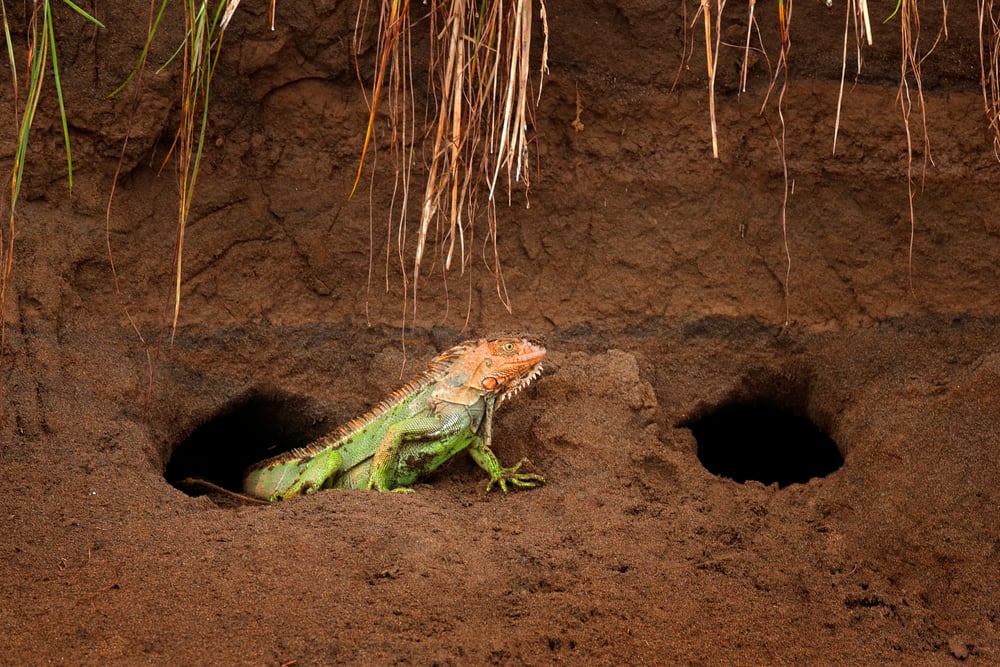Iguanas are known to dig holes in yards, which can be unsightly and pose a risk to people and pets. Understanding iguana behavior is essential to controlling their presence in your yard.
If you notice holes in your yard, it could be a sign of iguana activity. Identifying these holes and other signs of iguana activity is crucial to preventing further damage. Iguana holes can cause tripping hazards and damage to lawn equipment, and they can also attract other animals to your yard.
Preventing iguanas from digging holes in your yard requires a combination of techniques. Effective iguana control measures include habitat modification, filling holes, and removing iguanas from your property. Iguana Control offers a range of services to help you keep these reptiles at bay, including iguana removal and habitat modification.
Understanding Iguana Behavior
Iguanas are fascinating creatures that are known for their unique behaviors. Understanding Common behavior of iguanas is crucial in controlling their activity in your yard. Iguanas are herbivores and are primarily active during the day. They are known for basking in the sun to regulate their body temperature and are often found near water sources.
Signs of Iguana Activity
One of the most obvious signs of iguana activity is the presence of iguana burrows. Iguanas typically dig deep burrows that are up to 6 feet long and 3 feet deep. These burrows are often found near water sources and provide iguanas with a safe and cool place to rest.
Another sign of iguana activity is the presence of iguana droppings. Iguana droppings are typically green and can be up to 2 inches long.
Potential Risks and Damage Caused by Iguana Holes
Iguana holes can cause significant damage to your yard and pose a potential risk to you and your family. These holes can be a tripping hazard and can cause damage to lawn mowers and other garden equipment. They can also attract other animals, such as rodents and snakes, to your yard.
Preventative Measures for Iguana Control
Preventing iguanas from digging holes in your yard can be achieved by using a variety of methods. One effective method is to install a physical barrier around your yard. This can be achieved by using a fence or netting that is buried at least 1 foot deep. Another effective method is to remove any potential food sources from your yard, such as fruit trees or vegetable gardens.
Effective Techniques for Filling Iguana Holes
Filling iguana holes can be a challenging task, but it is essential in preventing further damage to your yard. The most effective method is to fill the hole with soil and pack it down firmly. It is important to ensure that the soil is level with the surrounding ground to prevent tripping hazards.
Other Iguana Control Services Offered by Iguana Control
In addition to filling iguana holes, Iguana Control company offers a range of other services to help control iguana activity in your yard. These services include iguana removal and habitat modification. Iguana Control can also provide advice on how to prevent iguanas from entering your yard in the first place.
Assessing the Impact of Iguanas
Potential Risks and Damage
Iguanas can cause significant damage to yards and gardens. They are known for digging holes in the ground, which can be dangerous for people walking or running in the area. Iguana holes can also damage lawn mowers and other equipment.
In Florida, iguanas are considered an invasive species, green iguanas are the most common species and their presence can disrupt the local ecosystem. They can compete with native species for food and habitat. So knowing Green iguana facts you can help yourself.
Identification and Dangers of Iguana Holes
Iguana holes can be identified by their size and shape. They are typically round or oval-shaped, and can be up to several inches in diameter. The holes are often located near trees or other areas with soft soil.
The dangers of iguana holes include the risk of injury to people and pets. Additionally, the holes can damage lawn mowers and other equipment, which can be costly to repair or replace.
To prevent these risks and damage, it is important to take measures to control iguana populations and fill in any existing holes. Iguana Control offers effective techniques for filling iguana holes and other services to help prevent damage from these invasive species.
Iguana Hole Remediation
Preventative Measures
To prevent iguanas from digging holes in your yard, there are a few measures you can take. One effective method is to install a fence around your property. The fence should be at least six feet high and made of materials that iguanas cannot climb, such as smooth metal or concrete.
Effective Filling Techniques
When it comes to filling iguana holes, it is important to use the right techniques to ensure the holes do not reappear. One effective method is to fill the hole with a mixture of soil and sand. This mixture will be more compact and less likely to collapse over time.
Another effective technique is to use a foam sealant to fill the hole. This sealant will expand to fill the entire space and harden, creating a barrier that iguanas cannot penetrate.
Additional Iguana Control Strategies
Comprehensive Control Services
Iguana Control has the best Cost of iguana removal offers a range of comprehensive control services to help homeowners deal with iguana problems. These services include:
- Iguana Removal: Our team of experts uses humane trapping methods to capture iguanas and relocate them to a safe location.
- Habitat Modification: Modifying your property may include removing food sources, trimming vegetation, and installing barriers
- Iguana Exclusion: Iguana Control can install exclusion devices such as fences and netting to prevent iguanas from entering your property.


